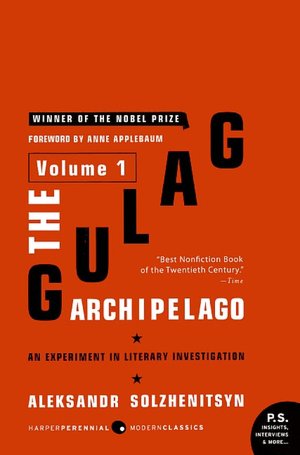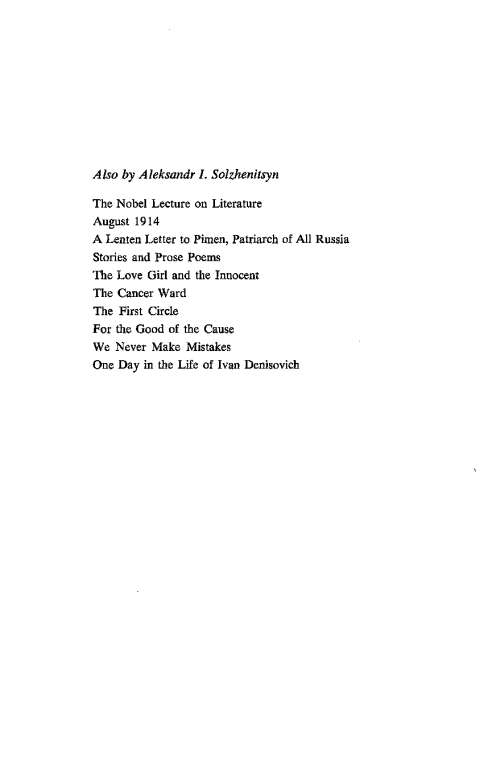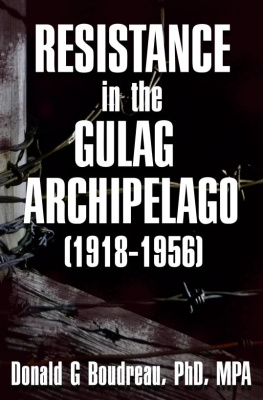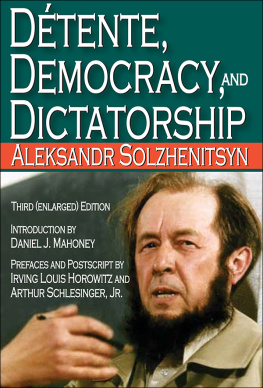Aleksandr I. Solzhenitsyn - The GULAG Archipelago, Volume 1: An Experiment in Literary Investigation
Here you can read online Aleksandr I. Solzhenitsyn - The GULAG Archipelago, Volume 1: An Experiment in Literary Investigation full text of the book (entire story) in english for free. Download pdf and epub, get meaning, cover and reviews about this ebook. genre: Politics. Description of the work, (preface) as well as reviews are available. Best literature library LitArk.com created for fans of good reading and offers a wide selection of genres:
Romance novel
Science fiction
Adventure
Detective
Science
History
Home and family
Prose
Art
Politics
Computer
Non-fiction
Religion
Business
Children
Humor
Choose a favorite category and find really read worthwhile books. Enjoy immersion in the world of imagination, feel the emotions of the characters or learn something new for yourself, make an fascinating discovery.

- Book:The GULAG Archipelago, Volume 1: An Experiment in Literary Investigation
- Author:
- Genre:
- Rating:5 / 5
- Favourites:Add to favourites
- Your mark:
- 100
- 1
- 2
- 3
- 4
- 5
The GULAG Archipelago, Volume 1: An Experiment in Literary Investigation: summary, description and annotation
We offer to read an annotation, description, summary or preface (depends on what the author of the book "The GULAG Archipelago, Volume 1: An Experiment in Literary Investigation" wrote himself). If you haven't found the necessary information about the book — write in the comments, we will try to find it.
The GULAG Archipelago, Volume 1: An Experiment in Literary Investigation — read online for free the complete book (whole text) full work
Below is the text of the book, divided by pages. System saving the place of the last page read, allows you to conveniently read the book "The GULAG Archipelago, Volume 1: An Experiment in Literary Investigation" online for free, without having to search again every time where you left off. Put a bookmark, and you can go to the page where you finished reading at any time.
Font size:
Interval:
Bookmark:



When people today decry the abuses of the cult, they keep getting hung up on those years which are stuck in our throats, '37 and '38. And memory begins to make it seem as though arrests were never made before or after, but only in those two years.
Although I have no statistics at hand, I am not afraid of erring when I say that the wave of 1937 and 1938 was neither the only one nor even the main one, but only one, perhaps, of the three biggest waves which strained the murky, stinking pipes of our prison sewers to bursting.
Before it came the wave of 1929 and 1930, the size of a good River Ob, which drove a mere fifteen million peasants, maybe even more, out into the taiga and the tundra. But peasants are a silent people, without a literary voice, nor do they write complaints or memoirs. No interrogators sweated out the night with them, nor did they bother to draw up formal indictments it was enough to have a decree from the village soviet. This wave poured forth, sank down into the permafrost, and even our most active minds recall hardly a thing about it. It is as if it had not even scarred the Russian conscience. And yet Stalin (and you and I as well) committed no crime more heinous than this.
And after it there was the wave of 1944 to 1946, the size of a good Yenisei, when they dumped whole nations down the sewer pipes, not to mention millions and millions of others who (because of us!) had been prisoners of war, or carried off to Germany and subsequently repatriated. (This was Stalin's method of cauterizing the wounds so that scar tissue would form more quickly, and thus the body politic as a whole would not have to rest up, catch its breath, regain its strength.) But in this wave, too, the people were of the simpler kind, and they wrote no memoirs.
But the wave of 1937 swept up and carried off to the Archipelago people of position, people with a Party past, yes, educated people, around whom were many who had been wounded and remained in the cities... and what a lot of them had pen in hand! And today they are all writing, speaking, remembering: "Nineteen thirty-seven!" A whole Volga of the people's grief!
But just say "Nineteen thirty-seven" to a Crimean Tatar, a Kalmyk, a Chechen, and he'll shrug his shoulders. And what's 1937 to Leningrad when 1935 had come before it? And for the second-termers (i.e., repeaters), or people from the Baltic countries weren't 1948 and 1949 harder on them? And if sticklers for style and geography should accuse me of having omitted some Russian rivers, and of not yet having named some of the waves, then just give me enough paper! There were enough waves to use up the names of all the rivers of Russia!
It is well known that any organ withers away if it is not used. Therefore, if we know that the Soviet Security organs, or Organs (and they christened themselves with this vile word), praised and exalted above all living things, have not died off even to the extent of one single tentacle, but, instead, have grown new ones and strengthened their muscles it is easy to deduce that they have had constant exercise.
Through the sewer pipes the flow pulsed. Sometimes the pressure was higher than had been projected, sometimes lower. But the prison sewers were never empty. The blood, the sweat, and the urine into which we were pulped pulsed through them continuously. The history of this sewage system is the history of an endless swallow and flow; flood alternating with ebb and ebb again with flood; waves pouring in, some big, some small; brooks and rivulets flowing in from all sides; trickles oozing in through gutters; and then just plain individually scooped-up droplets.
The chronological list which follows, in which waves made up of millions of arrested persons are given equal attention with ordinary streamlets of unremarkable handfuls, is quite incomplete, meager, miserly, and limited by my own capacity to penetrate the past. What is really needed is a great deal of additional work by survivors familiar with the material.
In compiling this list the most difficult thing is to begin, partly because the further back into the decades one goes, the fewer the eyewitnesses who are left, and therefore the light of common knowledge has gone out and darkness has set in, and the written chronicles either do not exist or are kept under lock and key. Also, it is not entirely fair to consider in a single category the especially brutal years of the Civil War and the first years of peacetime, when mercy might have been expected.
But even before there was any Civil War, it could be seen that Russia, due to the makeup of its population, was obviously not suited for any sort of socialism whatsoever. It was totally polluted. One of the first blows of the dictatorship was directed against the Cadets the members of the Constitutional Democratic Party. (Under the Tsar they had constituted the most dangerous ranks of revolution, and under the government of the proletariat they represented the most dangerous ranks of reaction.) At the end of November, 1917, on the occasion of the first scheduled convening of the Constituent Assembly, which did not take place, the Cadet Party was outlawed and arrests of its members began. At about the same time, people associated with the "Alliance for the Constituent Assembly" and the students enrolled in the "soldiers' universities" were being thrown in the jug.
Knowing the sense and spirit of the Revolution, it is easy to guess that during these months such central prisons as Kresty in Petrograd and the Butyrki in Moscow, and many provincial prisons like them, were filled with wealthy men, prominent public figures, generals and officers, as well as officials of ministries and of the state apparatus who refused to carry out the orders of the new authority. One of the first operations of the Cheka was to arrest the entire committee of the All-Russian Union of Employees.
One of the first circulars of the NKVD, in December, 1917, stated: "In view of sabotage by officials... use maximum initiative in localities, not excluding confiscations, compulsion, and arrests." []
And even though V. I. Lenin, at the end of 1917, in order to establish "strictly revolutionary order," demanded "merciless suppression of attempts at anarchy on the part of drunkards, hooligans, counter-revolutionaries, and other persons" [] Even though he perceived and suggested the basic directions punishment should take, Vladimir Ilyich proposed that "communes and communities" should compete to find the best methods of purging.
It is not possible for us at this time fully to investigate exactly who fell within the broad definition of insects, the population of Russia was too heterogeneous and encompassed small, special groups, entirely superfluous and, today, forgotten. The people in the local zemstvo self-governing bodies in the provinces were, of course, insects. People in the cooperative movement were also insects, as were all owners of their own homes. There were not a few insects among the teachers in the gymnasiums. The church parish councils were made up almost exclusively of insects, and it was insects, of course, who sang in church choirs. All priests were insects and monks and nuns even more so. And all those Tolstoyans who, when they undertook to serve the Soviet government on, for example, the railroads, refused to sign the required oath to defend the Soviet government with
Font size:
Interval:
Bookmark:
Similar books «The GULAG Archipelago, Volume 1: An Experiment in Literary Investigation»
Look at similar books to The GULAG Archipelago, Volume 1: An Experiment in Literary Investigation. We have selected literature similar in name and meaning in the hope of providing readers with more options to find new, interesting, not yet read works.
Discussion, reviews of the book The GULAG Archipelago, Volume 1: An Experiment in Literary Investigation and just readers' own opinions. Leave your comments, write what you think about the work, its meaning or the main characters. Specify what exactly you liked and what you didn't like, and why you think so.








